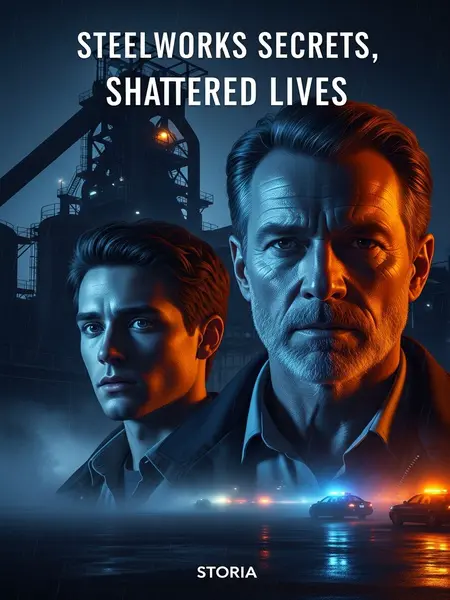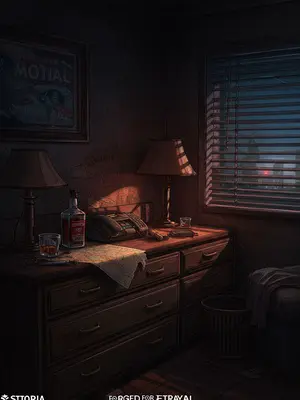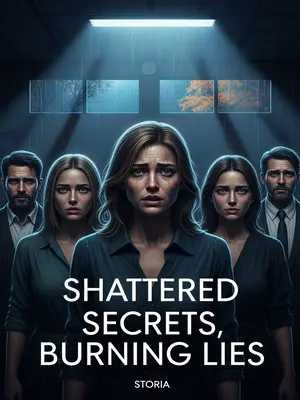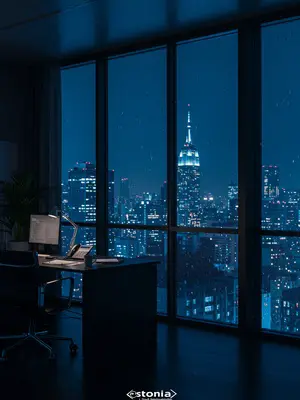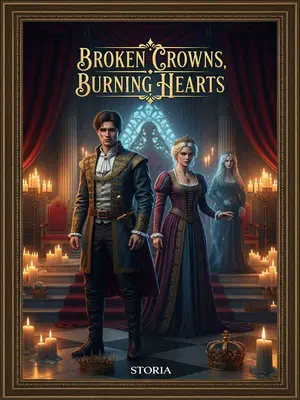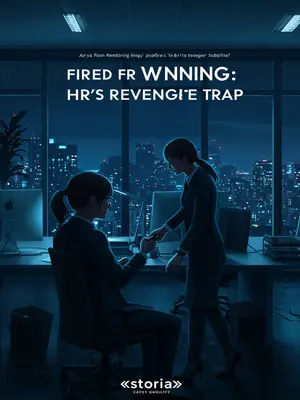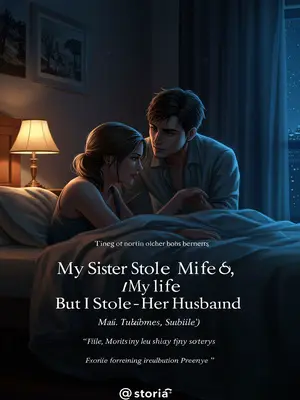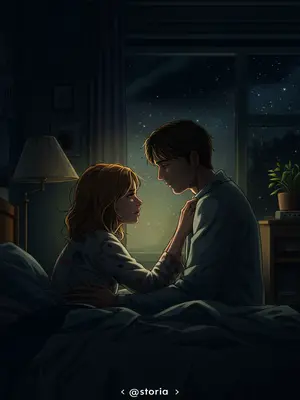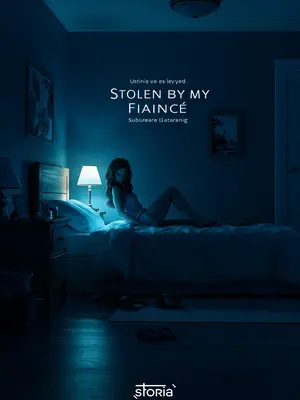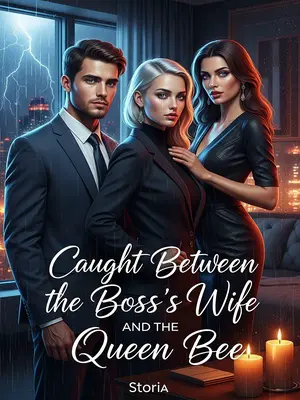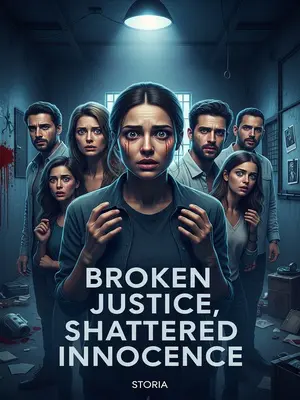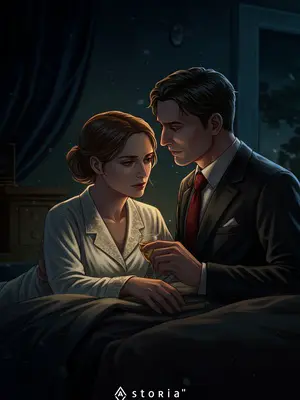Chapter 7: Redemption at the Water’s Edge
After splitting the cash, the four talked about burning her clothes. Someone suggested each keep a piece for leverage.
They planned to use the money to start a business together, keeping each other in check. If anyone squealed, they’d all go down.
So the evidence survived. Even years later, the coat still had Mariah’s blood and their fingerprints.
We hauled the other three in for questioning. We figured it was over, but the other three, like they’d been warned, all claimed Carl was framing them. They demanded to confront him, or they’d clam up.
The confrontation happened at the station. Everyone was cuffed, surrounded by cops. We thought it was locked down.
But the second they saw Carl, Heath Jennings managed to loop his cuffed hands around Carl’s neck, while the other two slammed him into the wall.
It was chaos. Cops fired warning shots, but it didn’t matter. They just kept swinging, wild-eyed.
When it was over, all four were dead. Carl suffocated. Heath was shot and bled out. Walter and Howard had poison in their teeth.
Turns out, the three had poison stashed in their mouths, waiting to kill Carl and themselves.
Chief Chen and I had seen plenty of criminals, but none so dead-set on dying rather than talking.
Clearly, someone was pulling the strings. We were even more sure the killer was a cop.
Life’s not like TV—poison has to come from somewhere. What they used was gangster stuff. With this, Hunter Byers and Jack Newton almost brought down Riverbend’s underworld. Drug busts need evidence, but anti-terror just needs a list.
Eventually, they pointed to someone—Lee Chun. He’d fought hard against reopening the old case. He also couldn’t say where he was when Quinn Mills died.
If not for Carl’s confession, Hunter would’ve grilled him. Chief Chen suspended him, but without proof, couldn’t hold him.
While he was out, Lee passed on a message and staged the whole show.
He knew his number was up, so he confessed.
“My dad was dying. I just had to pass on a few messages for them to save him. I couldn’t say no.”
“But all I really did was talk to Brian Bishop.”
“I told him, someone would use his wife’s life to make him confess. If he didn’t, his son would be next.”
He said the four paid him $2,000—a lot back then.
He looked miserable. “I never thought my words would make Brian kill himself. I didn’t mean for that to happen.”
I believed him. Back then, he was just a rookie, barely involved—mostly just filing papers.
But now, he’d tangled with gangsters, too.
Chief Chen told me, “He begged for another shot. When I said no, he cursed me—said if I could work with crooks, why couldn’t he?”
Chief Chen just kept pouring drinks. “Cap, I messed up. I thought the higher up I got, the more I could change. Turns out, no matter how high you go, you’re still stuck.”
The case seemed wrapped up. Jennings, Cross, Mills, and Tate killed Mariah Yu. Lee Chun pushed Brian Bishop to suicide. The kids chased Ben into the river.
But I still had doubts. Like, why did Mariah show up at the steelworks?
Jennings, Cross, Mills, and Tate were dead. But we figured their wives had to know something—no way the people closest to them were clueless.
Chief Chen came to me. “We’ve got the old case moving, but the three new murders have no suspects. Could it be Ben?”
If it was revenge, Ben was the obvious choice.
But nobody knew where Ben was.
I saw the lines on Chief Chen’s face, guessed what he was thinking. “You think Ben’s in the department?”
“I’ve checked everyone’s files, looked for anyone Ben’s age. No match.”
“I think he’s hiding something. I need someone I can trust to dig deep.”
I grinned. “You trust me that much?”
“Cap, from day one, you taught me everything. You’re my rock. With you, I can sleep at night.”
Now, we didn’t just have to answer to the brass—we had to answer to thousands online. Everyone was watching, waiting for answers. If we didn’t solve it, nobody would be spared.
I said yes. Still, I was torn. If Ben was the killer, did he deserve to be punished? Hell if I knew.
While I was digging, Hunter Byers made a big catch. While grilling the wives of the four, he found out they’d only stolen $400,000, but Sullivan reported $800,000 missing. Where’d the rest go?
Back then, Sullivan had come to me in tears, acting like the plant’s fate was his own. When he said the plant was finished, he looked finished, too.
But the missing cash wasn’t taken by Brian or the others. If not Sullivan, who else?
Hunter was sharp. He didn’t start there—he started with Sullivan’s private life.
After the plant shut down, everyone went their own way. The four took their $400,000 to Dallas, made a killing, came back rich. Later, they split up, started their own businesses. Back then, nobody cared where their startup money came from.
Same with Sam Sullivan. After the plant folded, he left, built a big business, and came back to retire with a young woman—just a lover, not a wife.
She was the break Hunter needed. She was always covered in bruises—old and new—not enough to kill, but enough to show someone liked hurting her. Just like Mariah Yu.
The four confessed to rape and murder, but not to torturing Mariah.
At first, Sullivan denied it, but Hunter found proof. Sullivan had given Mariah a necklace—a family heirloom from his wife—and there was a photo of Mariah wearing it.
Sullivan got to be plant manager thanks to his wife. The plant had been hers, before it was nationalized, but her family still had pull.
But his wife was older, not much to look at, and he had no say at home. Over time, he got into hurting women.
Mariah was one of them. But he was slick, never using his real name—always someone else’s. Back then, nobody checked IDs, and Brian Bishop’s name sounded more respectable than Sam Sullivan’s.
Faced with proof, he cracked.
“That $800,000 was the last of the plant’s worth. I wanted to take it, but I needed to make it look clean.”
“Brian Bishop was too by-the-book. I made copies of the keys, set him up for the theft, blamed it all on him.”
“But that wasn’t enough. Someone had to die.”
“Only a death would throw the plant into chaos.”
“I was done with Mariah. But she got smart, threatened me...”
He even laughed. “Yeah, a necklace. I gave her my wife’s, and she saw a photo in an old magazine.”
“She said if I didn’t get her a job, she’d tell my wife.”
“I figured only the dead keep secrets, so I set her up.”
“That night, I called her to the plant, hurt her, then gave her Brian’s address, said I’d pay her.”
He explained, “Yeah, I dictated, she wrote it. Her handwriting—the cops could tell.”
“She didn’t care about the name. She just wanted a steady job.”
“But she was clueless—the plant was about to go under.”
“I told her to check the finance office first.”
“At that time, the four unlucky ones would be there. I picked them on purpose—looked honest, but weren’t. Once they knew they were getting canned, they’d act. I made sure they knew about the money. If they didn’t bite, it wouldn’t make sense.”
“So, just like I planned, they killed Mariah.”
At this point, Brian wasn’t involved. Even if Sullivan planned it all, how could he be sure Brian would show up right then?
Sullivan shrugged. “Didn’t have to plan. He’s that kind of guy. With all that money, he couldn’t sleep.”
“But his wife was so sick, he couldn’t stay at the office. He had to go home, cook, help his kid with homework. Timing worked out.”
“To get to the office, he didn’t need to go past Warehouse 6, but there was a shortcut.”
“That’s why Mariah ran that way.”
“If you block the other path, she’s got no choice.”
“Even if he didn’t go straight there, once he saw the office was robbed, he’d chase that way. He was bound to hit the scene.”
“Whether he saw the body or the crime, he was dead meat. Those four could take him.”
Sullivan got more animated, asking Hunter, “Pretty smart, huh?”
“A three-birds-with-one-stone plan—how many could pull that off?”
“Best part, I blamed the plant’s collapse on Brian. I walked away clean.”
Chief Chen and I watched from behind the glass, seeing every twitch, hearing every word. If it weren’t for that glass, I’d have gone after him myself.
To him, lives were nothing.
Hunter stared him down. “I’ll see you cry in court, make you kneel at their graves, make you show every bit of fear before you go.”
But Sullivan didn’t care. He calmly took off his wig, revealing a bald, spotted scalp.
“I started losing hair in my forties. Doc says I’ve got cancer—won’t be around much longer.”
“I thought about leaving a good name, but why bother? Better to be remembered as a villain.”
He laughed, then coughed up blood, and died at the hospital.
Lucky for us, the whole thing was on tape—no threats, no rough stuff. Otherwise, we’d have had hell to pay.
The dancer case was finally closed. When I boxed up the files again, I felt fired up, like I’d finally got my fight back.
In my cases, nobody gets railroaded.
I told Chief Chen, “I want to clear Brian Bishop’s name, let everyone know the truth.”
But he shook his head. “Not till we find Ben.”
The killer was out for revenge. Sullivan’s body was desecrated, the last piece of the osmanthus stick shoved in him, his corpse covered in burn marks, like someone had taken out years of rage on it.
I figured the killer wanted to destroy what was left of that monster, since he couldn’t do it while Sullivan was alive.
But now the pressure was on us. Everyone was sure Ben was the killer, but nobody could find him.
After talking it over with Chief Chen, we set a trap—pretending to protect Carl Tate’s son, Carter, by moving him to a safe house. We played up the secrecy, but let the location slip.
That night, we caught a masked man. Chief Chen yanked off the hood—and it was Hunter Byers.
But Hunter explained, “Chief Chen, I only did this to draw Ben out. With his pattern, he’d want to go after the kids, too. But Sullivan’s sons are out of town, protected. So Carter’s the target. If something happened to Carter, Ben would show.”
Who would’ve thought a cop was the killer?
Hunter was hauled into the box, and I questioned him myself. I’d dug up his background—he was an orphan, adopted at ten, so no one really knew his history. He was from Riverbend, left at eight, just like Ben. His name—Hunter Byers—had the letters for Ben in it; ‘Ben’ is half of ‘Byers.’
I also found a wall of photos in his place—old steelworkers, especially the families of the four. All their info, mapped out in detail—no way that was done overnight.
But he just said he was thorough, and it didn’t prove murder.
Still, there was something he didn’t count on. Back then, I’d taken Brian’s blood for DNA. Even though Mariah’s sample was useless after all those years, blood can last. If we compared it to Hunter’s, we’d know if he was Ben.
When he heard that, he went pale. But the results floored us—he wasn’t Ben.
“Even if I am Ben, so what? Ben’s got a reason, but you’ve got no proof he did anything.”
Chief Chen and I were sure Hunter was the killer, but not Ben. Without motive, we couldn’t get him.
“Cap, should we call in the state?”
Chief Chen looked wiped out. After this case, he was a shell of himself. Maybe he was scared he’d end up like Lee Chun.
I told him I’d back whatever he decided—just like he’d said before, “Cap, sometimes you gotta survive before you can do the job.”
But I wasn’t ready to let go. I wanted the truth. Even if someone deserved to die, it should be in a courtroom, not on the street.
I started to wonder about myself. If Ben was the killer, I’d pity him. But if not, I wanted him to face justice. With no proof, Hunter was released, but for his break-in at the safe house, Chief Chen suspended him, and he quit—just like I did years ago.
But he didn’t run. He played ball with the investigation. Even the task force found nothing. The case stayed open, but everyone knew it would be shelved.
Right after the task force left, Carter Tate disappeared. At the same time, Hunter bought a ticket out of Riverbend. Jack Newton chased after him.
That’s when I realized who Ben was.
Jack came back, looking beat. He hadn’t caught Hunter, but the cops found Carter—taken by his real dad. Carl Tate’s only son wasn’t even his. The irony stung.
That night, Jack came to me. “Chief, can you give Ben’s iron tag back to me?”
I pretended to be surprised. He was steady as ever. “Chief, I know you know who I am. I know you sent me after Hunter so I could make things right. I know you took my hair for DNA, but I switched it. I thought I was safe, but forgot police DNA is on file.”
He suddenly dropped to his knees. “Sorry, I’m not cut out to be a cop. I let Hunter go.”
Yeah. Every cop’s DNA is in the system. Why bother hiding?
Jack’s thinness wasn’t natural—it was a disguise. Otherwise, someone might’ve recognized him as Brian’s son. He also figured his dad’s death was tied to the cops, so he stayed under the radar.
“I always wanted to clear my dad’s name, but after all these years, I couldn’t do what Hunter did.”
“Those people deserved what they got, right?”
“Why should the law protect them?”
“My dad was wronged, but why didn’t the law help him?”
He cried, right there. “Chief, I’m lost. I wanted to clear my dad, but now I’m turning myself in. Would my folks forgive me?”
I helped him up. “You ever hear of Huarong Pass? Zhuge Liang let Guan Yu guard it so Cao Cao could escape. What you did isn’t enough to jail you, but it’s a hard thing to live with.”
When I was young, I never thought about the pain behind every case. When Chief Chen wanted to change the system, he thought little stuff didn’t matter, but it all adds up. Ben, who tried to do things by the book, couldn’t keep the faith in the end.
As for Hunter Byers—only he knows why he did what he did. He could be a cop one minute, an executioner the next. Only he knows what’s in his heart.
Truth is, I realized something else: Hunter spared Ben. With his skills, Ben would’ve never made it back alive if Hunter didn’t want him to.
Later, I found proof Hunter killed—Quinn’s clothes. He killed her in a rage, didn’t have time to ditch them, just tossed them in the river. Jack found them when he saved him, but kept quiet.
Because of that, I got back on the investigation team. After Chief Chen left, I took over. Maybe this was where I belonged all along.
I disciplined Jack, sent him out to a rural post. Later, after Hunter killed again, I brought Jack back, told him to make it right by catching Hunter.
After twenty years of hiding, I learned how to play the game, turn people against each other. Who’d have thought, when Hannah died, I already knew who Jack was? At first, I wanted to use him to crack the old case, but then Hunter showed up. That worked, too.
I’ve got nothing to hide from Brian or Ben. Not even from myself. No one’s calling me useless anymore.
Extra—Hunter Byers
As the boat was about to leave, I heard Jack calling “Byers” over and over, each time it hit me in the gut.
Looking at this skinny guy, I finally got it. His thinness was an act. I stood on the dock, waiting for him to come closer.
But from a distance, he waved and smiled. “Byers, I came to see you off.”
For a second, I doubted myself.
He finally got close, slapped my arm and laughed, “Byers, you think we’ll meet again?”
Jack was never chatty, but now he seemed like a different guy—bright, warm, almost made me wish I didn’t have to go.
“Maybe,” I said, “yeah, maybe.”
Right then, with a million things to say, I couldn’t find a word.
The boat’s whistle snapped me out of it.
I slapped his arm. “Thanks for coming. See you around.”
The little knife at my belt was my last secret. Up close, it was for fighting; from a distance, for throwing.
Now, I tossed it into the water.
From here on out, whether I walk tall or run forever, it’s up to me.
But whatever you choose, stick with it—even if it means crawling.
Standing on the stern, watching Riverbend fade, I remembered the last time I left. Back then, I swore I’d come back. This time, I promised myself I’d never return.
“Sis, I’m leaving!”
“Sis, rest easy!”
“Sis, don’t worry! I’ll be okay.”
Everyone thought Ben was out for his parents. No one thought Mariah Yu died horribly, and someone cared enough to avenge her. Just because she was a dancer, her life was worth nothing.
I’m an orphan. Back in ‘93, when the big layoffs hit, my parents lost their jobs. Two old folks sick, an uncle who couldn’t work, four hungry kids—nine mouths to feed. One quilt, bare feet year-round. When there was nothing left, my folks spent their last money on a slab of pork, cooked it up with cabbage and noodles. The smell made us drool. But I was the youngest, ate slow. I was the only one who survived, but honestly, it didn’t feel like living.
But I was too little to know better—just wanted to survive. I became a beggar. If dogs could eat it, so could I.
Somehow, I ended up in Riverbend. I stopped at a place that looked like heaven—men in suits, women in fancy clothes, bright lights, music, good smells. I thought it was the best place ever.
I ran in, got chased by bouncers, tossed out like trash. Someone even pissed on me, saying I couldn’t even die in the right spot.
It was freezing. The wind cut through me. The warm piss turned to ice. I thought I was dead.
But then, through the blur, I saw a flash of red. A woman wiped my face with a handkerchief and smiled. “Come home with me!”
She gave me a bath, clean clothes, sweet potatoes. She was like an angel.
She asked, “Where are your parents?”
“Dead.”
“Mine, too,” she said. She cut my hair. “What’s your name?”
“Don’t remember. People call me Wildcat.”
She tilted her head, touched my nose. “You do look like a wildcat.”
She told me, “I’m Mariah Yu—” She stretched out the ‘Yu,’ her voice soft, her smile warm as sunshine. “But everyone calls me Red Rose.”
She said, “From now on, I’m your sister. You’re my brother. We’ll stick together.”
All I wanted was to eat my fill. Her dream was to quit dancing. She wanted a job at the steelworks—even cleaning toilets—just to have something steady, never worry about food again.
I warned her the plant wasn’t doing well, layoffs were coming. She just laughed. “Steel is what built this country. As long as America stands, the plant stands. Once I’m in, I’ll send you to school. You gotta study to make it.”
That night she left, and never came back.
When I heard the news, the Bishops were already gone.
I never believed Brian did it. She told me her man was a creep—bald, made her call him brother. Brian was a young guy.
He saved my sister from worse. His kindness let her keep a shred of dignity.
Clearing his name—that’s on me.
Letting Ben go wasn’t my mercy—it was paying Brian back.
But there’s still some folks out there who haven’t paid.
